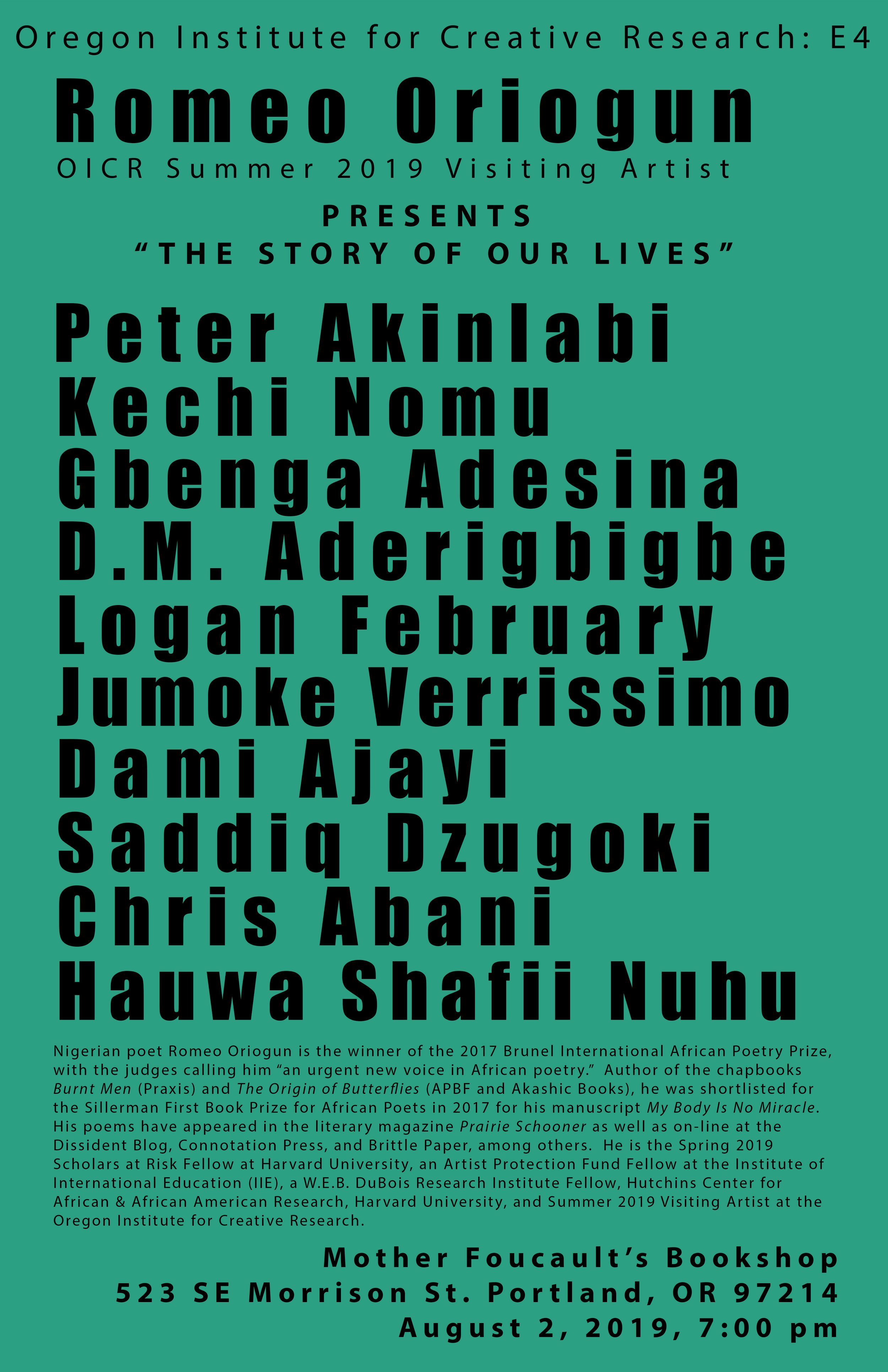
Romeo Oriogun's "Cotonou" published in The New Yorker
Cotonou
1. THE MEETING PLACE OF BIRDS
In some folklore, birds would always meet at the edge
of a town. It was how they knew they were on a journey
to save themselves from the sudden loss of a season.
At the intersection of three busy roads, two buses broke down
and spilled us out, humans tired of the road.
We watched the beauty of the Presidential palace.
I wondered how many days of sweat went into the earth
to produce such beauty. While smoking, I met a man called Trolley,
named for his expertise in flinging humans across borders.
His works of terror were suffering in the coldness of brothels
across Bamako, across Tripoli, across Mauritania, and on the red sand of Kayes.
He watched his girls drink gin on the sidewalk.
I asked him, Do you feel shame?
He answered, I desire beauty. In its pursuit there is no end,
only ruthlessness.
The road sang a dirge, the girls danced in sadness.
There, on the road that is no home, I looked into his eyes
and saw the terror of exploitation.
A leaf fell from a tree nearby
and again I was reminded of the endless movement
of the world, of the girls dancing, of the sadness of my fingers obeying
the call of my body’s addiction to nicotine,
as a bird sang of leaving the world as it is,
a terror, a war we are still living in.
2. ADVERTISEMENT
A sign on the road read:
Buy handmade drums
and beat the wildness of your soul.
What is the sound of all our sorrow?
Years after a war, a veteran went crazy
from hearing in his head
the wailing of a thousand women
who gave up peace to sing their dead
sons to the afterlife.
Is this not a kind of wildness?
Music breeds its own fear,
a song leads us to our loneliness
as the spools of a cassette turning
in a radio render us into an animal
dying in an empty lair.
What is the ache of the night?
What is the emptiness of a city
full of voices?
The voice of exile is the dying voice
of a wounded angel.
I beat the drum of my life
and the angel and I dance
to its wild sadness,
even God ran away from this rhythm.
Look around you, we are left
alone with the mud of creation
and maybe that is all there is to life,
the creating of a new way of living,
but God! Where do we hide the violence?
3. VOICES
The driver says, in the dark of the night,
when every passenger is asleep,
he hears the true language of the road.
He says he hears the voices of cities
thousands of miles away.
The voice of exile
is a murmur crossing rivers and sea,
crossing empty roads until it washes
over a man, a baptism of loss.
If the road and the driver could speak to each other,
what will be this language born out of friction?
Would it be the hum of sleep
in the bodies of exhausted travellers?
Would it be the bristling of biscuit wrappers?
The driver’s eyes are full of dreams,
full of the excitement of new cities.
He could be the poorer incarnate of Mansa Musa
who instead of pouring gold dust into air
pours stories to compete with sand,
stories of nomads, people running in
and out of cities. Perfect gold, this human scroll
of chronicles. Even Bessie Head, giant of letters,
who battled sands for stories, would be proud
of this precision of narrative, this perfect bridge
of the imagined and the songs of mothers rocking babies
as countries cut through their bodies.
4. HOTEL DU CHIRURGIE
Our bus parked beside a water fountain,
a cherub spilled water from pouted lips.
Across the hotel park, there were oysters
heaped on enamel trays, fried behind walls,
they were offered to us as secrets
of the sea. Behind this market of oysters,
there was once a market for flesh,
in Ouidah, in rooms filled with Black flesh
in chains, branded like cattle, herded into pens
by other Black men paid in clear bottles of gin.
The sea crashed on naked stones
and we ran into the hotel bar.
Perched on a three-legged stool,
an old Black woman sang the fable of siblings
lost at sea, she was a lamp attracting us as moths.
There were opened windows, sunflowers in broken pots,
curtains made out of beads sang in the wind,
birds flew in and out.
Smoking a carefully rolled blunt, I listened to this place,
a silent television played a Nollywood movie.
We were trapped in time, in the commodification
of flesh, saints without the gift of ablution.
In some other world, I am guilty of silence,
just as I am in this one.
Do not forgive me. It was dawn
and I walked toward the bus
as the sea received into its bosom
the memory of a ship
travelling to a new world.
To hear the poet read his own poem, see the October 25 (online) issue at <https://www.newyorker.com/magazine/2021/11/01/cotonou>








